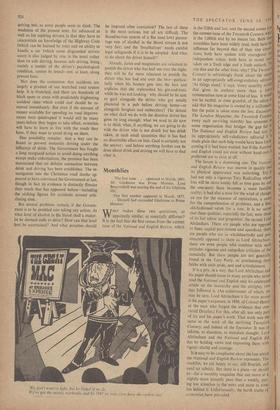Monthlies
'The first issue . . appeared in March, 1883. Mr. Gladstone was Prime Minister. Lord Beaconsfield was nearing the end of his fabulous life.'
'Our first number appeared in March. 1877, . Disraeli had succeeded Gladstone as Prime Minister.'
WttAr makes these two quotations, so apparently similar, so essentially different? It is the fact that the first comes from the current issue of the National and English Review, which
'We don't want to fight, but by Jingo! if we do We've got the atomic warheads', and by 1965 w( may even have the rockets too.' .
the current issue of the Twentieth Century, is the 1,000th and by no means last. Both thest, monthlies have been widely read, both have ba! influence far beyond that of their tiny cireidli Lions, both have spoken with courageous 311'. independent voices, both have in recent year taken on a fresh edge and a fresh outlook. Ye: one dies and the other lives; why? The Twent0 Century is refreshingly frank about the reas.00 . in an appropriately self-congratulatory editorig 'As things stand,' it says, 'every monthly revie° that gives its authors more than a loke11 remuneration runs at some kind of loss 11 woulu, not be tactful, or even grateful, of the editor add that his magazine is owned by a millionaire. but the point is taken none the less. Encounter' The London Magazine, the Twentieth Centut)' every such surviving monthly has someone or some organisation that bridges the gap for !I. The National and English Review had no I.° its appropriately self-valedictory editorial it IS made plain that such help would have been forth' coming if it had been wanted; but if the Nationo1 and English could not exist without hand-outs . preferred not to exist at all. The lesson is a depressing one. The National and English Review was uneven in quality and its physical appearance was uninviting. Yet it had not only a vigorous Tory Radicalism who loss will be more keenly felt as time goes by and the • one-party State becomes a more familiar reality; it had also a nose for the wind of change, an eye for the measure of reputations, a mind for.the comprehension of problems, and a fine' old-fashioned •relish for a row. It is no secret that these qualities, especially the last, were those of its last editor and proprietor, the second Lord Altrincham. There are People whO are opposed to Suez, capital punishment and apartheid; there are people who are as wholeheartedly and pas" sionately opposed to them as Lord Altrincham: there are even people who combine with such attitudes vigorous and outspoken criticism of the monarchy. But these people are not generallY found in the Tory Party, or proclaiming their faiths with such pride, zest and articulateness.
It is a pity, in a way, that Lord Altrincham and his paper should mean to many people who never read the National and English only his celebrated article on the monarchy and the almighty row that followed it. (An achievement of which. w: may be sure, Lord Altrincham-is far more proud is the paper's exposure, in 1898, of Colonel HenrY as the man who forged the evidence that con- victed Dreyfus.) For this, after all, was only part of his and his paper's work. That work was the same as the work of the surviving Twentieth Century, and indeed of the Spectator. It was to inform, to elucidate, to stimulate thought. Lord Altrincham and the National and English did this by holding views and expressing them with vigour, clarity and courage.
It is easy to be complacent about the loss which the National and English Review represents. The weeklies, we are happy to say, still flourish, and need no subsidy. But there is a place—or should be—for a monthly magazine that can move at a slightly more leisurely pace than a weekly, pay- ing less attention to the news and more to what lies behind it. Unfortunately, the harsh truths of economics have prevailed.










































 Previous page
Previous page